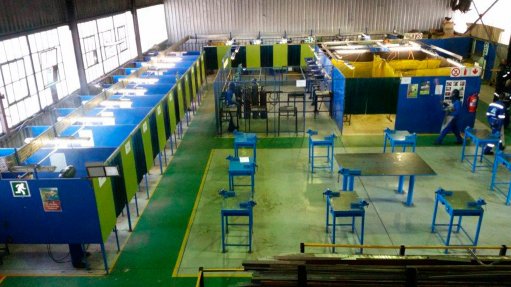
ARTISAN CULTIVATION The training centres collectively specialise in welding, boilermaking, fitting and rigging and produce about 165 artisans over 24 to 48 months
Engineering company Steinmüller Africa’s technical training academy is rapidly introducing young blood into its welder, boilermaking, rigging and fitting teams to boost the company’s on-site maintenance welding and cutting teams. Steinmüller Africa’s welding operations manager Morne Kidson notes that about 25% of the teams comprise young, newly qualified artisans who are welding at each of the company’s contract sites.
“Young trainee welders who have the right aptitude and talent are welding high-chrome X20 materials in physically demanding/challenging positions. Moreover, they have good production values and achieve a low repair rate in terms of rework,” he tells Engineering News, adding that their quality of welding compares relatively well with that of the more experienced welders.
Steinmüller Africa’s training department is accredited by the South African Institute of Welding, according to the International Institute of Welding standards.
The company’s technical training academy now consists of three centres – collectively specialising in welding, boilermaking, fitting and rigging – in Sebokeng and Pretoria, in Gauteng, and in Bethal, Mpumalanga.
Collectively the training centres produce about 165 artisans over 24 to 48 months, says Steinmüller group training administration manager Sonet Jordaan.
Currently, the training academy has the largest complement of female welder trainees, with an enrolment ratio of 60% female welders and 40% male welders.
“While the female welders might not have the brute strength, which is needed for welding, their attention to detail is significant and a comparative advantage,” says Jordaan.
Experience Gap
Despite strides having been made in attracting young artisans to the welding community, Kidson laments the experience gap between qualified, experienced welders and their young apprentices.
He says there remains an industry-experience vacuum of between seven and ten years, when no artisans were trained. This trend is prevalent not only in South Africa but also worldwide, notes Kidson.
Jordaan agrees, highlighting the importance of informing younger generations of the vital roles of artisans and tradespeople in the industry.
While she believes Steinmüller Africa’s trainees mature faster and gain more experience, as a result of the coaching and mentoring initiatives at the academy, she acknowledges that the artisans still cannot be trained fast enough.
“Some knowledge is only gained from experience and, therefore, it will take time to replenish the skills and experience that have been lost in the industry,” she concludes.